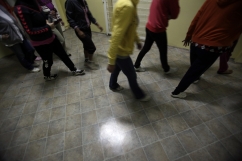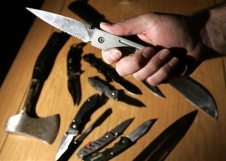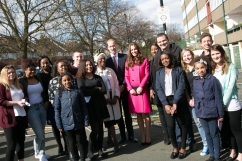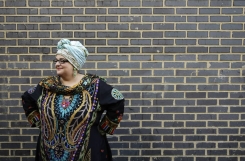Last night, an 18-year-old became the 13th victim of a fatal stabbing in London since the beginning of 2015. In the last year, 1,651 young people have been stabbed in the capital; a 26 per cent rise on figures two years ago.
Gathered in All Hallows on the Wall, London last night were experts in tackling knife crime, youth and charity workers and those affected by violent incidents to ask what can be done to stop the rise. Hosted by youth charity XLP and ITV presenter Nina Hossain, it was suggested that violence on the streets is growing in response to its increasing normalisation.
"From what I have seen in the trauma unit, the ferocity of attacks has increased," said Duncan Bew, clinical lead for trauma and emergency surgery at Kings College Hospital, who has been treating victims of knife crime for over a decade.
"Respect for human life has decreased and there has been a worrying acceptance and normalisation of violence."
Keynote speaker Sheldon Thomas, a leading gang member in London in the 1970s and now founder and chief executive of Gangsline, said that more must be done to take responsibility for the way that young people have been failed. That responsibility lies primarily not with the police or the government, he said, but with parents.
"We live in a society where in deprived communities, violence is seen as normal, and people who come from deprived communities are desensitised to violence," he said.
The film, music and gaming industries all glorify violence and the oppression of women, he added, and young people are given more access to these things than ever.
"We need to understand what we're up against. We're not just up against fathers missing from the house, we're not just up against mothers struggling to raise their children, we're up against a system that is trying to infiltrate our children."
Thomas also said we must not be afraid of the involvement of religious leaders. Prejudice often stops communities from actively trying to change things, he said. "If we've got a Muslim gang member, are we going to ask the imam to help, or is our prejudice going to stop us from going there? If we've got a child that comes from a Christian background, are we going to go to the church for help, or are our prejudices going to stop us from going there, too?"
"We've got to understand, Islam and Christianity – these people have gang members or ex-gang members in their flock...but because of our own prejudices against religion, we'd rather not go down that road," he said. It's vital to involve church leaders and imams, because they may be better equipped to deal with young people whose culture they understand.
"Our own prejudices stop us from helping our young people," he warned.
As news filtered in of the latest stabbing, Chief Superintendent of the Met Police, John Sutherland, highlighted the urgency of the situation."We should never let terrible repetition dull our senses...something has got to change," he insisted.
"Not just as a police officer, but as a Londoner, as a dad, something has got to change."
Brian Paddick, formerly of the Met Police and now principle spokesperson for the Lib Dems in the House of Lords on home affairs, agreed that better parenting is vital. He also said UK politicians need to make vital changes in response to increasing levels of crime on British streets. "We need to educate our politicians...so that people wake up to what is really happening out there, as opposed to the bubble of Westminster."
But until something shifts, it seems that young people will have to deal with the reality of knife crime. Also interviewed during the event was a 17-year-old who was stabbed in the head in February this year. He said that since then, he knows that others have begun carrying knives because they're afraid of also being attacked.
Through being mentored by XLP, however, he's been able to look forward. "I'm grateful I'm still breathing," he said. "XLP has helped me to do positive things."
XLP CEO Patrick Regan called for "a shift in culture", where young people are valued, and given hope for a better future. It is vital, he said, that they are given positive role models who believe in them, and refuse to give up.
Hannah, whose son Nathaniel was fatally stabbed in 2012, has worked for XLP for five years. She never imagined that she would one day have to deal with the reality of her own son being murdered. "I believe in the next generation, I believe in young people and I believe in empowering and encouraging them. So when Nathaniel was murdered, my passion and my way of being didn't change," she said.
"In many ways it intensified my work. I see it as a passion; a calling."
It's vital, Hannah continued, that communities come together to end violence among young people in the UK. "When someone dies, you see community emerge but it cannot stop there," she said.
"Young people need to consistently have people in their community that they can talk to and engage with. They need to feel valued and for someone to believe in them. They need a sense of belonging."

















